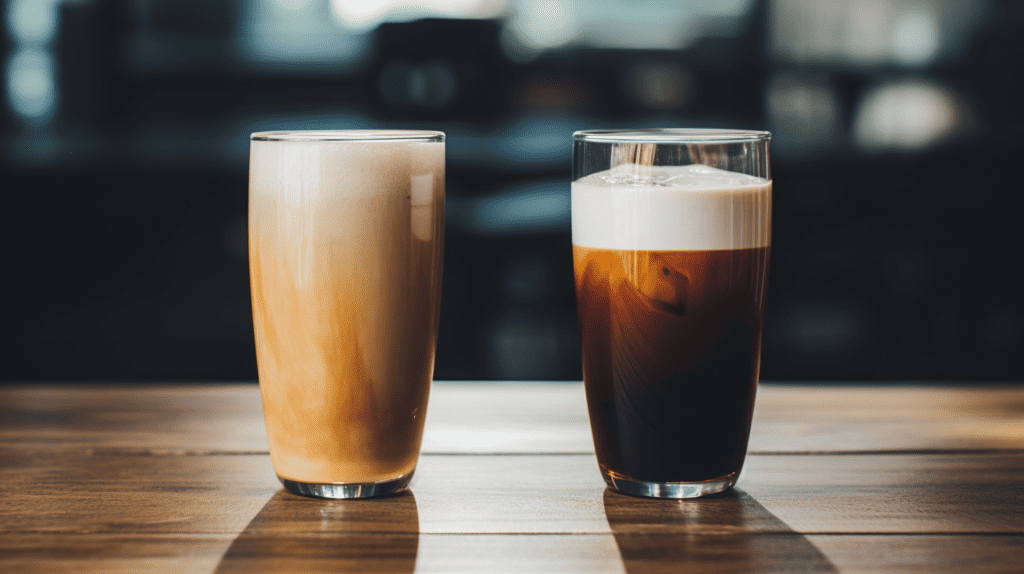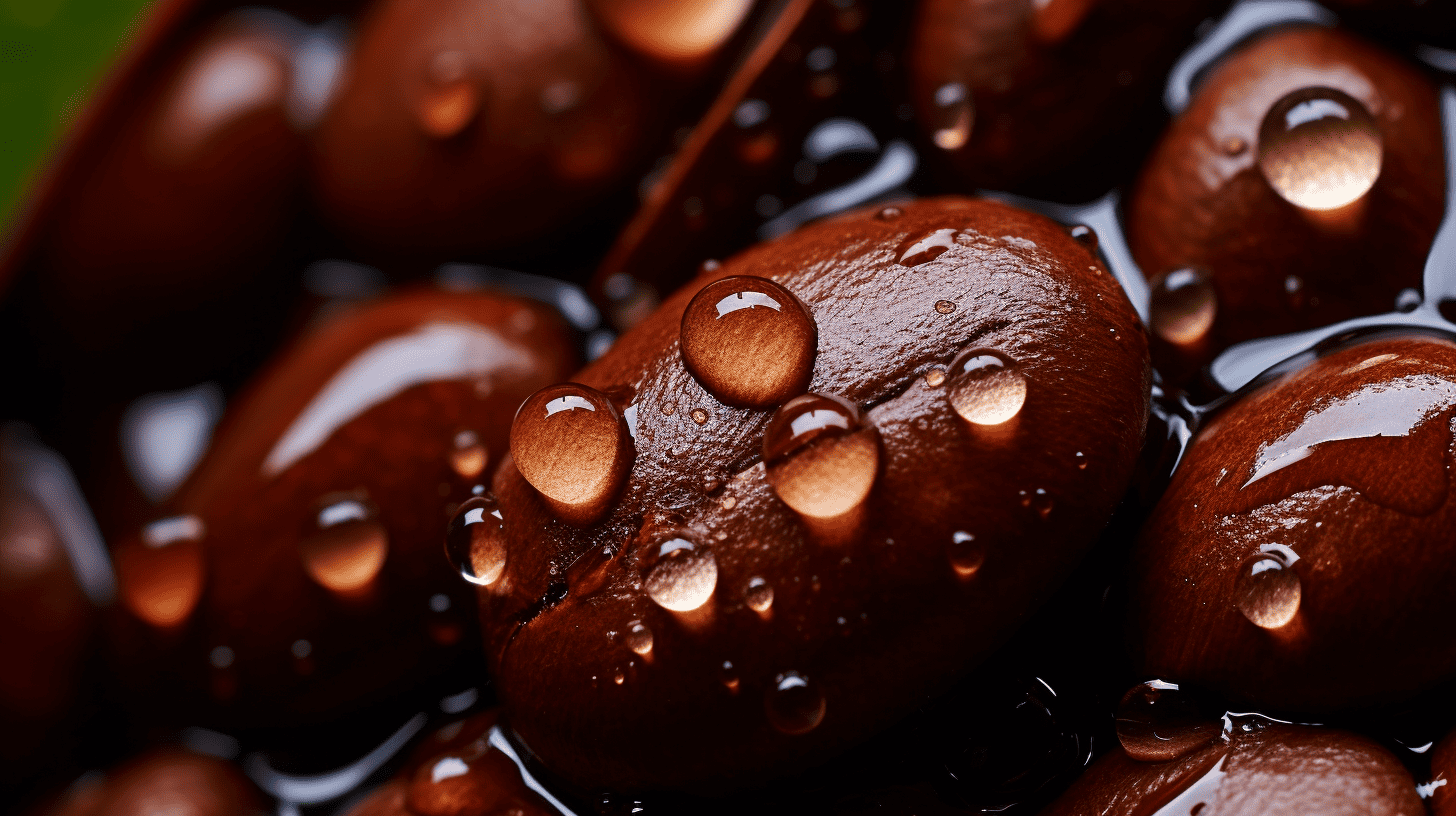Ever stuck in the eternal dilemma of which is better milk tea or coffee? You’re not alone – I too often find myself questioning which beverage is superior. With numerous research studies and data at hand, I’ve compiled a guide to answer your burning question.
Are you ready for some eye-opening brew truths?
Key Takeaways
- Milk tea is lower in calories and fat compared to coffee, making it a better option for those watching their waistline.
- Both milk tea and coffee contain antioxidants that can benefit overall health, but the specific types and amounts may differ.
- Coffee provides a higher caffeine content, which can help increase alertness and boost energy levels.
- Proper dental hygiene, such as regular brushing and flossing, can help minimize staining caused by coffee or milk tea.
Health Benefits of Milk Tea
Milk tea is lower in calories and fat compared to coffee.
| Health Benefit | Description |
|---|---|
| Provides strength to the body | Tea is rich in antioxidants, and milk is rich in calcium, potassium, and vitamins D and B12, which are important. |
| Improve skin health | Having milk or low-fat milk in moderation has great results on the skin. Essential fats and antioxidants present in the milk improve skin health, provide glowing skin, and prevent early aging. |
| Stress reliever | Milk tea has antidepressant effects due to the presence of nutrients, such as tryptophan, which help enhance mood and memory and reduce stress. Milk tea has caffeine that refreshes the body. It may trigger anxiety when taken in excess. |
| Good source of antioxidants | Milk tea is a good source of antioxidants, which can help protect the body from damage caused by harmful molecules known as free radicals. |
| Boosts heart health | Tea, especially black and green varieties, is rich in compounds that act as antioxidants and may help lower blood pressure and cholesterol levels, among other benefits. Some studies suggest that adding milk to tea may inhibit these benefits. |
| May have anticancer effects | Teas, especially green and black varieties, contain antioxidant compounds that may exert anticancer effects. However, it’s unclear whether adding milk to tea interferes with the activity of these compounds6. |
It’s worth noting that milk tea should be consumed in moderation, and adding sugar can negate some of its health benefits1.
Lower in calories and fat than coffee
Milk tea is better for your waistline. It has fewer calories and less fat than coffee. Drinking milk tea can lead to weight loss because it helps fill you up without loading you with too many unwanted extras like fat or sugar.
It’s a delicious drink that can help keep your body slim and trim!
Contains antioxidants
Both milk tea and coffee contain antioxidants, which are beneficial compounds that help protect our bodies from damage caused by free radicals. Antioxidants can also help reduce inflammation and support overall health.
While both beverages offer this advantage, the specific types and amounts of antioxidants may differ. For example, coffee is known to be rich in chlorogenic acid, while tea contains catechins.
These antioxidants have been linked to various health benefits like improved heart health and reduced risk of chronic diseases. So whether you prefer milk tea or coffee, you can enjoy a tasty drink with the added bonus of antioxidant benefits for your body.
May boost metabolism and aid in weight loss
Drinking milk tea or coffee may have benefits for boosting metabolism and aiding in weight loss. Both beverages contain caffeine, which can temporarily increase your metabolic rate and help you burn more calories.
Additionally, studies have shown that the antioxidants found in milk tea and coffee may also play a role in weight management by reducing inflammation and improving insulin sensitivity.
However, it’s important to note that these effects are modest and should not be relied upon as a sole strategy for weight loss. It’s best to incorporate regular exercise, along with a balanced diet, to achieve sustainable weight loss goals.
Health Benefits of Coffee
Coffee provides a higher caffeine content, which can help increase alertness and boost energy levels.
| Health Benefit | Description |
|---|---|
| Helps burn more calories | Coffee can help increase metabolism and aid in weight loss. |
| Improves blood circulation | The caffeine in coffee can help improve blood flow and reduce the risk of heart disease. |
| Has a pain-reducing effect | Coffee can help reduce pain, including headaches and post-workout muscle soreness. |
| Helps preserve muscle tissue | Coffee can help prevent muscle breakdown and improve muscle performance. |
| Improves memory | Coffee can help improve cognitive function and memory. |
| Lowers risk for depression | Coffee consumption has been linked to a lower risk of depression. |
| Reduces risk of some cancers | Coffee drinkers have a lower risk of liver and colorectal cancer. |
| Reduces risk for heart disease | Coffee can help reduce the risk of heart disease and stroke. |
| Helps combat gout | Coffee can help lower uric acid levels and reduce the risk of gout. |
| Provides nutrients and antioxidants | Coffee is a source of B vitamins, potassium, and phenolic compounds that act as antioxidants. |
| Makes you more energetic | Coffee can help increase energy levels and improve physical performance. |
| Lowers risk of Alzheimer’s | Coffee consumption has been linked to a lower risk of Alzheimer’s disease and dementia. |
| Protects liver health | Coffee can help protect against liver cirrhosis in people at risk of the disease. |
| Lowers risk of some cancers | Coffee drinkers have a lower risk of liver and colorectal cancer. |
| Helps ward off depression | Coffee consumption has been linked to a lower risk of depression. |
| Reduces inflammation | Coffee consumption has been linked to lower levels of inflammation in the body. |
| Can be part of a healthy diet | Moderate coffee consumption has been recognized as part of a balanced diet and has been associated with a reduced risk of several chronic diseases. |
Note: The health benefits listed above are based on scientific studies and research, but it is important to note that individual results may vary and excessive coffee consumption can have negative effects on health.

Provides a higher caffeine content
Coffee is known for its higher caffeine content compared to milk tea. A cup of coffee typically has more caffeine than a cup of tea, which can provide a stronger energy boost. Caffeine is a stimulant that can help improve alertness and focus, making it a popular choice for many people in the morning or when they need an extra pick-me-up during the day.
So if you’re looking for a beverage with a higher caffeine content, coffee would be the way to go.
Contains antioxidants
Both milk tea and coffee contain antioxidants, which are beneficial for our health. Antioxidants help to reduce the damage caused by harmful molecules called free radicals in our bodies.
They can protect against chronic diseases like heart disease and cancer. So, whether you choose milk tea or coffee, both can provide you with these important antioxidants that support your overall well-being.
May improve cognitive function and boost energy
Coffee has been shown to have potential benefits for cognitive function and energy levels. It contains caffeine, which acts as a stimulant for the brain. Caffeine can help improve focus, alertness, and attention span.
It may also enhance memory and reaction time. Additionally, coffee provides a quick energy boost due to its caffeine content. This can be particularly beneficial when you need a pick-me-up during the day or before engaging in mentally demanding tasks.
So if you’re looking to improve your cognitive function and get an energy boost, a cup of coffee may be just what you need!
Considerations for Weight Loss
When it comes to weight loss, milk tea may be a better option due to its lower calorie content. But remember, both can be enjoyed in moderation as part of a balanced diet. Find out more about the benefits of milk tea and coffee in our blog!
Milk tea may be a better option due to lower calorie content
If you’re looking to cut down on calories, milk tea might be a better choice compared to coffee. Milk tea generally has fewer calories than coffee, which can help with weight management.
Plus, it still offers a delicious and satisfying flavor. So if you’re watching your calorie intake but still want a tasty beverage, consider giving milk tea a try!
Both can be enjoyed in moderation as part of a balanced diet
I enjoy both milk tea and coffee, and I believe that they can both be enjoyed in moderation as part of a balanced diet. It’s important to remember that these drinks should not replace nutritious meals but can be included as a tasty treat or pick-me-up throughout the day.
Milk tea and coffee offer different flavors and benefits, so it really depends on personal preference when deciding which one to enjoy. Both beverages contain antioxidants, which are good for our bodies.
So whether you’re sipping on a creamy milk tea or enjoying a hot cup of coffee, know that you can indulge in moderation while still maintaining a healthy lifestyle!

Dental Health
Coffee may stain teeth more than milk tea, but proper dental hygiene can help minimize staining. Read on to learn more about the impact of these beverages on your dental health.
Coffee may stain teeth more than milk tea
Coffee lovers, listen up! While that cup of joe may give you a much-needed boost of energy in the morning, it’s important to be aware of its potential effect on your teeth. You see, coffee has a higher staining potential compared to milk tea.
The dark pigments present in coffee can cause those unsightly yellowish stains on your pearly whites. On the other hand, milk tea is less likely to stain your teeth as severely. Of course, proper dental hygiene like regular brushing and flossing can help minimize staining regardless of your beverage choice.
So next time you reach for that cup of coffee or milk tea, consider the impact it may have on maintaining that bright smile.
Proper dental hygiene can help minimize staining
Taking good care of your teeth can help prevent staining caused by coffee. Here are some tips to keep your smile bright:
- Brush your teeth at least twice a day to remove surface stains.
- Use a whitening toothpaste that can help lift and remove coffee stains.
- Floss daily to remove plaque and prevent buildup between your teeth.
- Rinse your mouth with water after drinking coffee to wash away any lingering residue.
- Consider using a straw when drinking coffee to minimize contact with your teeth.
- Visit your dentist regularly for professional cleanings and advice on maintaining dental health.
Conclusion on Which Is Better Milk Tea Or Coffee
In conclusion, whether milk tea or coffee is better depends on personal preference and individual health goals. Milk tea may be a better option for those watching their calorie intake, while coffee provides a higher caffeine content.
Both beverages offer different benefits and can be enjoyed in moderation as part of a balanced diet. So, choose the one that suits your taste buds and aligns with your dietary needs!
Is Matcha More Effective for Weight Loss Compared to Coffee?
When it comes to matcha and coffee weight loss benefits, many individuals wonder which one is more effective. Matcha contains higher levels of antioxidants than coffee, known as catechins, which may boost metabolism and aid in weight loss. Coffee, on the other hand, can increase energy levels and suppress appetite, contributing to calorie burn. Ultimately, both can be beneficial in weight loss efforts, but it is important to maintain a balanced diet and overall healthy lifestyle.
FAQs on Which Is Better Milk Tea Or Coffee
1. Is milk tea healthier than coffee?
Milk tea and coffee have different nutritional profiles, but it ultimately depends on the ingredients and preparation methods. Both can be enjoyed in moderation as part of a balanced diet.
2. Does milk tea or coffee have more caffeine?
Generally, coffee has higher caffeine content than milk tea. However, the caffeine levels can vary depending on the type of tea used in milk tea and the brewing strength of coffee.
3. Can I drink milk tea or coffee if I’m lactose intolerant?
If you’re lactose intolerant, it’s important to choose dairy-free alternatives for both milk tea and coffee, such as almond milk or oat milk. These options can provide similar flavors without triggering lactose intolerance symptoms.
4. Which one is better for digestion: milk tea or coffee?
The effects on digestion may vary from person to person. Some individuals find that certain teas, like herbal teas or green teas found in some types of milk teas, are gentler on their stomachs compared to traditional brewed coffees. Experimenting with different options can help determine which works best for you.





Leave a Reply